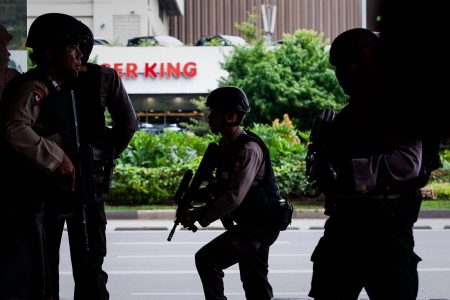
Detained Islamic State-linked suspects in the latest terrorism raid in Indonesia
Indonesia’s police anti-terrorism squad shot and killed one suspect and arrested two others in a raid on the main island of Java, seizing weapons and chemicals allegedly used for bomb making, officials said Thursday in a development that once again spotlighted the Southeast Asian state’s ongoing terrorism challenge.
The man fatally shot by police resisted arrest by wielding a long sword, said National Police spokesman Argo Yuwono.
The suspects were linked to a banned militant organization responsible for recent attacks on police, a local affiliate of the Islamic State group known as the Jama’ah Anshorut Daulah, Yuwono said. The group is among those that has been in the spotlight in previous terrorist attacks conducted in Indonesia in recent years.
The raid took place in Subah village of Batang district in Central Java province late Wednesday.
Yuwono said police seized two machetes, a sword, a bayonet blade, and materials often used by militants to make bombs, and were interrogating the two suspects.
Indonesia has been battling militants previously as well, with the last wave coming in the 2000s in a post-September 11 environment. Most famously, the 2002 bombings on the resort island of Bali killed 202 people, mostly foreign tourists. Attacks aimed at foreigners have been largely replaced in recent years by smaller, less deadly strikes targeting the government, police, and anti-terrorism forces, inspired by Islamic State group attacks abroad.
Indonesian police have been criticized for shooting suspects rather than trying to arrest them. Authorities say they are forced to defend themselves.
A rights group, the Islamic Study and Action Center, reported that police have killed at least 135 suspected militants between 2003 and 2016, and The Associated Press recorded at least 44 others have died during police raids since 2017.
Indonesia has also mulled other measures as well in order to manage its terrorism challenge, including refusing to repatriate former Islamic State fighters domestically and advancing intelligence sharing mechanisms with neighboring Southeast Asian states.
Source: The Diplomat





